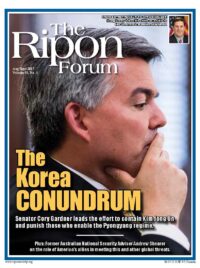
The Senate filibuster has got to go. It is completely contrary to American political science, and has devolved into nothing more than a minority veto – one to which the American people never consented.
The chief principle of American republicanism is that, as Thomas Jefferson put it, “the will of the majority honestly expressed should give law.” His attitude typified Americans of the Revolutionary Era. Having made war under the banner of “No taxation without representation,” they moved while the Revolution raged to establish popular government.
Their first step in doing so was to establish popularly adopted, written, republican constitutions — the first the world had ever seen. The first of them, George Mason’s Virginia Constitution of 1776, made the state government extremely responsive to voters. Not only did the bicameral legislature elect the governor and the state judges, but the lower house, whose members had one-year terms and small districts, had the sole power to initiate bills. The governor, with neither a veto nor an appointment power, was exceedingly weak.
Ben Franklin’s 1776 Pennsylvania Constitution went even further, eliminating the office of governor altogether and establishing a unicameral legislature. When the Continental Congress got around to drafting Articles of Confederation the following year, they provided for a unicameral Congress highly beholden to state officials. Local elections to state legislatures would continue to predominate.
Famously, nationalists of the 1770s and ’80s agitated for a continental convention to revise (really, replace) the Confederation Government with something more independent of the states. Both the South Carolina delegate Charles Pinckney and the Virginia delegation to the Philadelphia Convention prepared plans for national (not federal) governments for colleagues’ consideration.
The chief principle of American republicanism is that, as Thomas Jefferson put it, “the will of the majority honestly expressed should give law.”
The Virginia Plan included a bicameral legislature apportioned by population. The lower house would be popularly elected, and it would elect the less numerous upper house. If James Madison had his way, the national legislature would have veto power over state laws. While amending the Articles had required all states’ consent, amending the new constitution would be easier.
The final version of the Constitution did not satisfy the nationalists’ desires. Small-state delegates disliked the apportionment provisions. Several delegates, including future Massachusetts governor and U.S. vice president Elbridge Gerry, told the Convention that the American problem had been “an excess of democracy.” They worked to limit Congress’s authority, deny Congress a veto over state laws, and have the state governments choose senators.
One thing all agreed on, however, was that majorities would govern. The majority of each house would speak. The Electoral College majority would win. The elected president would appoint judges with the consent of the Senate majority. The only supermajority provision concerned overrides of presidents’ vetoes, and even there, two-thirds of both houses was a lower requirement than the three-fourths earlier agreed.
Never did the Philadelphia Convention discuss the question of filibustering — or any minority veto. The Senate’s current rules about that arose almost by accident. When the First Congress’s 22 senators first met, they decided to allow unlimited debate. This posed little practical difficulty in a nonpartisan body.
Even a century ago, when the Senate adopted a rule allowing senators to shut off debate by two-thirds vote, it had very little effect. After the year-long Democratic filibuster of the Civil Rights Act of 1964, the Senate again changed the rules. Now, 60% of senators voting could cut off debate.
Even then, the majority still ran the Senate, more or less. Only in the last handful of Congresses have we come to a point at which, although they essentially never debate, the filibuster power allows even a forlorn minority of 41 senators to prevent the majority from legislating. Senators today feel no compunction about saying they are filibustering as a means of averting undesirable outcomes, and majority leaders do more or less nothing about it.
Why do Republicans not bring this drama to a close? After all, the most recent Democratic majority leader, Harry Reid of Nevada, said that in case Hillary Clinton were president and the Democrats controlled the Senate, the filibuster would be abolished. The Senate “will evolve with a majority vote determining stuff,” he said last August. “It is going to happen.” Either the Republicans would cease to filibuster, or “the Senate is going to wind up being a democracy.”
Conservatives can of course think of numerous negative likely outcomes of simple majority vote in the Senate, such as statehood for Puerto Rico and the District of Columbia. Faced with a “parade of horribles” likely to befall the Old Dominion in case the Constitution were ratified, James Madison responded that republicanism meant one had to trust the people. What else could he do? Let the majority govern, and trust it to govern well.
Tolerating perpetual obstruction of the majority’s desires has not been a good alternative. Nix the filibuster, and make majorities accountable.
Kevin R. C. Gutzman, JD, PhD, is Professor of History at Western Connecticut State University. His latest book is Thomas Jefferson – Revolutionary: A Radical’s Struggle to Remake America (St. Martin’s Press, 2017).




